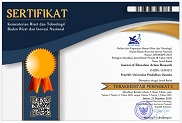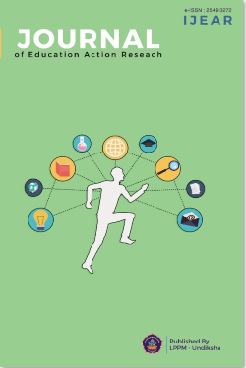Transforming Educational Paradigms: How Micro Learning Shapes Student Understanding, Retention, and Motivation?
DOI:
https://doi.org/10.23887/jear.v8i2.77711Kata Kunci:
Micro Learning, Student Engagement, Student Motivation, Educational EffectivenessAbstrak
Microlearning is an increasingly relevant approach to learning in the digital age, prioritizing information in small chunks such as short videos, infographics, or interactive quizzes to improve student understanding, knowledge retention, engagement, and motivation. Previous research shows the effectiveness of microlearning in various contexts, such as higher education, corporate training, and professional development. However, there are challenges in defining and measuring its effectiveness and its impact on student learning outcomes. This study aims to analyze a systematic literature review (SLR) to understand the efficacy of microlearning and its influencing factors more holistically. This study is a qualitative research using the SLR method. This study used a data collection method in the form of systematic observation. This study involved 23 eligible articles. After the data was collected, it was analyzed using the qualitative descriptive data analysis technique. As a result of the various references provided, the overview of the literature found on microlearning covers a wide range of relevant topics and applications. Thus, it can be concluded that microlearning has demonstrated its effectiveness in improving students' understanding of concepts and ability to retain knowledge in several areas of education. Thus, this research will provide deeper insights into the potential and effective micro-learning strategies in various educational contexts.
Referensi
Al-Zahrani, A. M. (2024). Enhancing postgraduate students’ learning outcomes through Flipped Mobile-Based Microlearning. Research in Learning Technology, 32. https://doi.org/10.25304/rlt.v32.3110.
Allela, M. A., Ogange, B. O., Junaid, M. I., & Charles, P. B. (2020). Effectiveness of Multimodal Microlearning for In-service Teacher Training. Journal of Learning for Development, 7(3), 384–398. https://doi.org/10.56059/jl4d.v7i3.387.
Arsyad, S., & Zainil, Y. (2023). Research gap strategies in article introductions of different rank applied linguistics journals. Studies in English Language and Education, 10(1), 216–234. https://doi.org/10.24815/siele.v10i1.25302.
Bransford, J. D., Brown, A. L., & Cocking, R. R. (2000). Early Childhood Development and Learning: New Knowledge for Policy. National Academies Press. https://doi.org/10.17226/10067.
Carter, J. W., & Youssef-Morgan, C. (2022). Psychological capital development effectiveness of face-to-face, online, and Micro-learning interventions. Education and Information Technologies, 27(5), 6553–6575. https://doi.org/10.1007/s10639-021-10824-5.
Conde-Caballero, D., Castillo-Sarmiento, C. A., Ballesteros-Yánez, I., Rivero-Jiménez, B., & Mariano-Juárez, L. (2024). Microlearning through TikTok in Higher Education. An evaluation of uses and potentials. Education and Information Technologies, 29(2), 2365–2385. https://doi.org/10.1007/s10639-023-11904-4.
Dolasinski, M. J., & Reynolds, J. (2023). Microlearning in the Higher Education Hospitality Classroom. Journal of Hospitality & Tourism Education, 35(2), 133–142. https://doi.org/10.1080/10963758.2021.1963748.
Furo, P. T., & Abbey, J. R. (2020). Opportunity To Learn And Student Academic Engagement As Correlates Of Students’ Achievement In Chemistry In Rivers State. International Journal of Education and Social Science Research, 03(03), 89–100. https://doi.org/10.37500/IJESSR.2020.3038.
Gagne, J. C., Park, H. K., Hall, K., Woodward, A., Yamane, S., & Kim, S. S. (2019). Microlearning in Health Professions Education: Scoping Review. JMIR Medical Education, 5(2), 13997. https://doi.org/10.2196/13997.
Garshasbi, S., Yecies, B., & Shen, J. (2021). Microlearning and computer-supported collaborative learning: An agenda towards a comprehensive online learning system. STEM Education, 1(4), 225. https://doi.org/10.3934/steme.2021016.
Gorham, T., Majumdar, R., & Ogata, H. (2023). Analyzing learner profiles in a microlearning app for training language learning peer feedback skills. Journal of Computers in Education, 10(3), 549–574. https://doi.org/10.1007/s40692-023-00264-0.
Gross, B., Rusin, L., Kiesewetter, J., Zottmann, J. M., Fischer, M. R., Prückner, S., & Zech, A. (2019). Microlearning for patient safety: Crew resource management training in 15-minutes. PLOS ONE, 14(3), 213178. https://doi.org/10.1371/journal.pone.0213178.
Hall, M., Ramsay, A., & Raven, J. (2004). Changing the learning environment to promote deep learning approaches in first-year accounting students. Accounting Education, 13(4), 489–505. https://doi.org/10.1080/0963928042000306837.
Ichiuji, B. A., DeAngelis, E. J., Corpodean, F., Thompson, J., Arsenault, L., Amdur, R. L., Vaziri, K., Lee, J., & Jackson, H. T. (2022). The Effect of a Microlearning Module on Knowledge Acquisition in Surgery Clerkship Students. Journal of Surgical Education, 79(2), 409–416. https://doi.org/10.1016/j.jsurg.2021.11.001.
Javorcik, T., Kostolanyova, K., & Havlaskova, T. (2023). Microlearning in the Education of Future Teachers: Monitoring and Evaluating Students’ Activity in a Microlearning Course. Electronic Journal of E-Learning, 21(1), 13–25. https://doi.org/10.34190/ejel.21.1.2623.
Karlsen, J. T., Balsvik, E., & Rønnevik, M. (2023). A study of employees’ utilization of microlearning platforms in organizations. The Learning Organization, 30(6), 760–776. https://doi.org/10.1108/TLO-07-2022-0080.
Lee, Y.-M., Jahnke, I., & Austin, L. (2021). Mobile microlearning design and effects on learning efficacy and learner experience. Educational Technology Research and Development, 69(2), 885–915. https://doi.org/10.1007/s11423-020-09931-w.
Li, Q., Jiang, Q., Liang, J.-C., Pan, X., & Zhao, W. (2022). The influence of teaching motivations on student engagement in an online learning environment in China. Australasian Journal of Educational Technology, 1–20. https://doi.org/10.14742/ajet.7280.
Mahmud, M. H., Nayan, M. T. H., Ashir, D. M. N. A., & Kabir, M. A. (2022). Software Risk Prediction. Systematic Literature Review on Machine Learning Techniques. Applied Sciences, 12(22), 11694. https://doi.org/10.3390/app122211694.
Membiela, P., Acosta, K., Yebra, M. A., & González, A. (2023). Motivation to learn science, emotions in science classes, and engagement towards science studies in Chilean and Spanish compulsory secondary education students. Science Education, 107(4), 939–963. https://doi.org/10.1002/sce.21793.
Mohamed Shaffril, H. A., Samsuddin, S. F., & Abu Samah, A. (2021). The ABC of systematic literature review: the basic methodological guidance for beginners. Quality & Quantity, 55(4), 1319–1346. https://doi.org/10.1007/s11135-020-01059-6.
Pölzl-Stefanec, E., & Geißler, C. (2022). Micro-steps” on the route to successful online professional development for Austrian Early Childhood Educators. International Journal of Educational Research, 115, 102042. https://doi.org/10.1016/j.ijer.2022.102042.
Puah, S., Bin Mohmad Khalid, M. I. S., Looi, C. K., & Khor, E. T. (2022). Investigating working adults’ intentions to participate in microlearning using the decomposed theory of planned behaviour. British Journal of Educational Technology, 53(2), 367–390. https://doi.org/10.1111/bjet.13170.
Rejemiati, R., Nawir, M., & Basri, B. (2022). Model Pembelajaran Berbasis Masalah (PBM) Terhadap Penguasaan Konsep IPS dan Kemampuan Memecahkan Masalah. Briliant: Jurnal Riset Dan Konseptual, 7(4), 946. https://doi.org/10.28926/briliant.v7i4.1044.
Richardson, M. X., Aytar, O., Hess-Wiktor, K., & Wamala-Andersson, S. (2023). Digital Microlearning for Training and Competency Development of Older Adult Care Personnel: Mixed Methods Intervention Study to Assess Needs, Effectiveness, and Areas of Application. JMIR Medical Education, 9, 45177. https://doi.org/10.2196/45177.
Roberson, Q. M., Moore, O. A., & Bell, B. S. (2024). An Active Learning Approach to Diversity Training. Academy of Management Review, 49(2), 344–365. https://doi.org/10.5465/amr.2020.0231.
Rogerson, A. M., & Rossetto, L. C. (2018). Accommodating Student Diversity and Different Learning Backgrounds. Journal of Intercultural Communication Research, 1–10. https://doi.org/10.1080/17475759.2018.1475293.
Romanenko, Y. N., Solodovnikova, E., & Maksimenko, N. (2023). Microlearning as a new method of teaching soft skills to university students. Frontiers in Education, 8, 1177516. https://doi.org/10.3389/feduc.2023.1177516.
Romero-Rodríguez, J.-M., Ramirez-Montoya, M. S., Glasserman-Morales, L. D., & Ramos Navas-Parejo, M. (2023). Collaborative online international learning between Spain and Mexico: A microlearning experience to enhance creativity in complexity. Education + Training, 65(2), 340–354. https://doi.org/10.1108/ET-07-2022-0259.
Sankaranarayanan, R., Leung, J., Abramenka-Lachheb, V., Seo, G., & Lachheb, A. (2023). Microlearning in Diverse Contexts: A Bibliometric Analysis. TechTrends, 67(2), 260–276. https://doi.org/10.1007/s11528-022-00794-x.
Sathiyaseelan, B., Mathew, J., & Nair, S. (2024). Microlearning and Learning Performance in Higher Education: A Post-Test Control Group Study. Journal of Learning for Development, 11(1), 1–14. https://doi.org/10.56059/jl4d.v11i1.752.
Scarino, A. (2022). Language teacher education in diversity – a consideration of the mediating role of languages and cultures in student learning. Language and Education, 36(2), 152–169. https://doi.org/10.1080/09500782.2021.1991370.
Skalka, J., Drlik, M., Benko, L., Kapusta, J., Rodríguez Del Pino, J. C., Smyrnova-Trybulska, E., Stolinska, A., Svec, P., & Turcinek, P. (2021). Conceptual Framework for Programming Skills Development Based on Microlearning and Automated Source Code Evaluation in Virtual Learning Environment. Sustainability, 13(6), 3293. https://doi.org/10.3390/su13063293.
Sözmen, E. Y., Karaca, O., & Batı, A. H. (2023). The effectiveness of interactive training and microlearning approaches on motivation and independent learning of medical students during the COVID-19 pandemic. Innovations in Education and Teaching International, 60(1), 70–79. https://doi.org/10.1080/14703297.2021.1966488.
Su, Q., Cheng, G., & Huang, J. (2023). A review of research on eligibility criteria for clinical trials. Clinical and Experimental Medicine, 23(6), 1867–1879. https://doi.org/10.1007/s10238-022-00975-1.
Troussas, C., Chrysafiadi, K., & Virvou, M. (2021). Personalized tutoring through a stereotype student model incorporating a hybrid learning style instrument. Education and Information Technologies, 26(2), 2295–2307. https://doi.org/10.1007/s10639-020-10366-2.
Wang, S., & Han, C. (2021). The Influence of Learning Styles on Perception and Preference of Learning Spaces in the University Campus. Buildings, 11(12), 572. https://doi.org/10.3390/buildings11120572.
Wee, B., & Banister, D. (2023). Literature review papers: The search and selection process. Journal of Decision Systems, 1–7. https://doi.org/10.1080/12460125.2023.2197703.
Zarshenas, L., Mehrabi, M., Karamdar, L., Keshavarzi, M. H., & Keshtkaran, Z. (2022). The effect of micro-learning on learning and self-efficacy of nursing students: An interventional study. BMC Medical Education, 22(1), 664. https://doi.org/10.1186/s12909-022-03726-8.
Zolfaghari, M., Shirzadi, S., & Motamed, M. (2023). Using a mobile application for psychiatry training in medical students: A quasi-experimental study. Australasian Psychiatry, 31(3), 389–394. https://doi.org/10.1177/10398562231159509.
Unduhan
Diterbitkan
Cara Mengutip
Terbitan
Bagian
Lisensi
Hak Cipta (c) 2024 Winny Astiwardhani, A. Sobandi

Artikel ini berlisensiCreative Commons Attribution-ShareAlike 4.0 International License.











